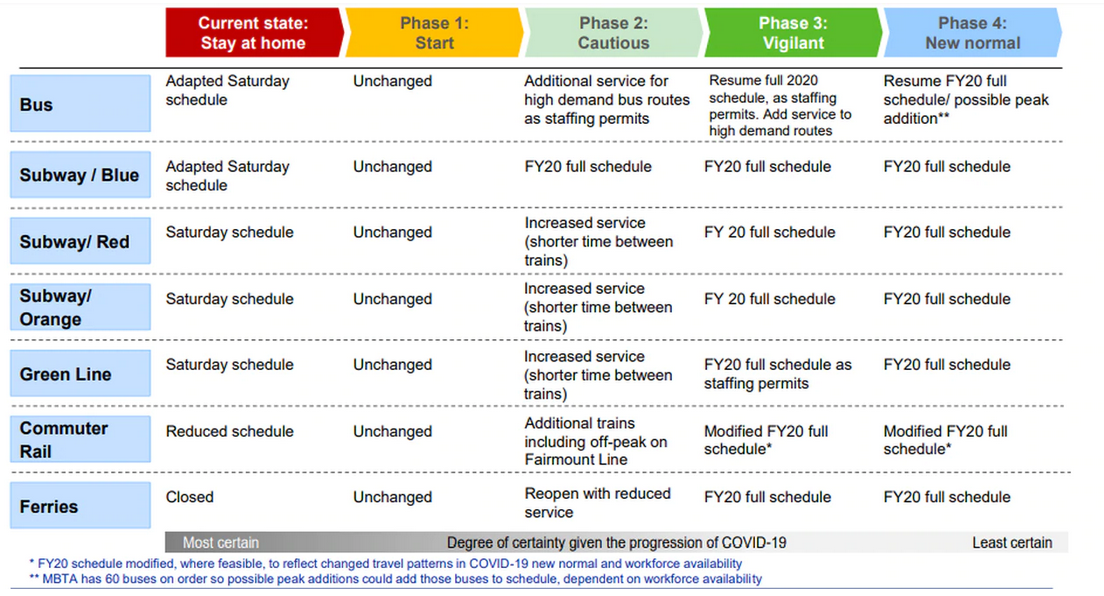BOSTON, May 20, 2020 — Re: The MBTA’s Role in Reopening and Recovery from COVID
TransitMatters is concerned with the Governor and MBTA’s plan to maintain reduced levels of service throughout the early phases of the reopening plan unveiled on Monday, May 18. We believe the MBTA’s immediate focus should be on providing frequent service, even with far below average ridership, to mitigate crowding for essential workers, starting in environmental justice communities. The response must be flexible and creative to evaluate crowding solutions in real time, especially for bus routes.
The MBTA must immediately take a new approach to bus transit. Demand on several bus routes remains strong and is getting stronger. On these routes, the MBTA needs to provide frequent all-day service, reducing on-board crowding and leaving no one waiting for a long time for the next available bus. As soon as protective shields for bus operators have been installed, the T should implement all-door boarding without worrying about fare collection during the various phases of COVID transition. This protects passengers by eliminating a point of contact, speeds up boarding thus increasing route capacity, and decreases crowding around the rear door. The MBTA should actively work with municipal leaders to establish new dedicated bus lanes on each high demand route, again prioritizing communities hit the hardest by COVID. We support LivableStreets in its call for the T to make masks or other face coverings available to riders. This makes enforcing the Governor’s order more feasible.
We also call on the T to make Regional Rail early-action items an immediate part of the solution by running frequent (every 15 minutes) service on the Fairmount Line, adding trips on the Boston-Salem route to provide service every 30 minutes on a clockface schedule, and committing to electrify the Providence/Stoughton Line, the Fairmount Line, and the Boston-Salem route as the FMCB voted on last year. Affirmative marketing and affordable fares from Lynn and Readville must accompany the service change. This will decrease crowding on nearby bus routes, giving riders more space on the larger trains, and decreasing travel time for the essential workers in these communities. Thankfully the Fairmount Line already offers affordable fares with free transfers to the subway planned. This same policy must be adopted for trips between Salem and Boston.
Electrification is vital as the MBTA begins the move to a system that no longer contributes to air pollution with polluting diesel locomotives. Faster, more reliable self-powered electric trains provide a better alternative to driving internal combustion engines that emit particulate matter, an established link to higher COVID mortality rates. The current health crisis has disproportionately stricken communities where pollution is highest, which include the Fairmount Line and the Environmental Justice corridor from Salem to North Station, notably in Chelsea. Rather than delaying implementation, the T must commit to eliminating emissions they control while providing the transportation access these communities and the surrounding region deserves.
Finally, we call on the MBTA to provide full weekday subway service that aligns with new ridership patterns by June 1, when Boston is scheduled to begin allowing the partial reopening of offices. The only way our entire community can chart a better path forward is for the T to lead by beginning to offer much lower headways (time between trains) – service that will prove its ability to provide access and mobility safely throughout the day. The T has to act first; the T has to lead. We stand ready, together with our advocacy allies, to support the MBTA at this challenging time.
For media inquiries, please e-mail media@transitmatters.org.
The Commonwealth’s transit plan that maintains levels of reduced service (less than full schedule) through early phases. May 18, 2020

